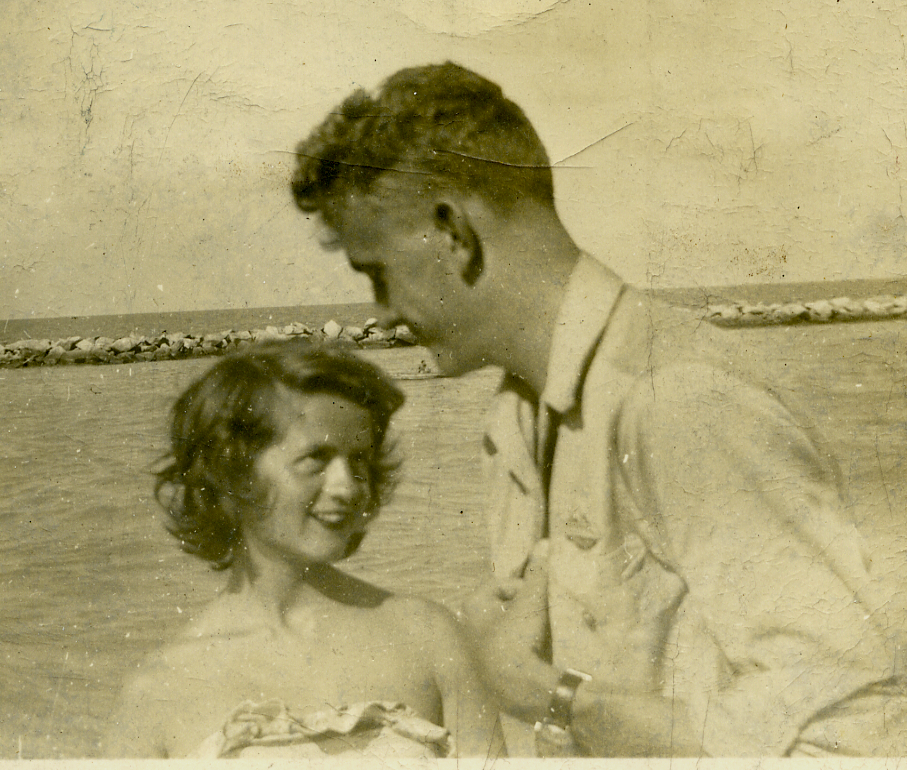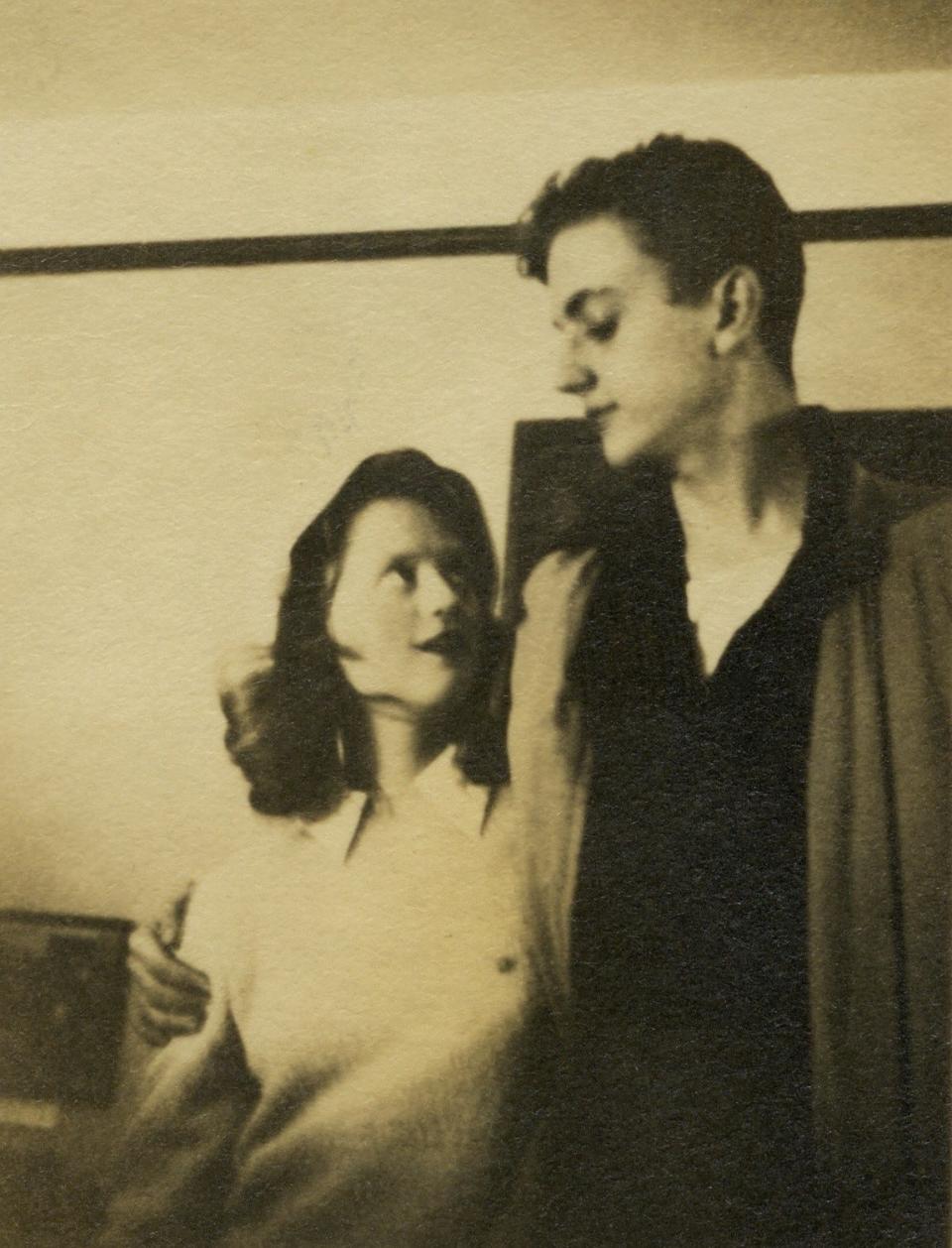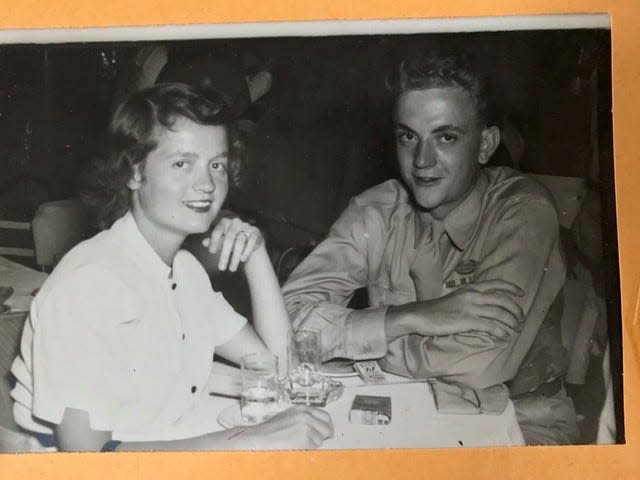226 love letters from Kurt Vonnegut were found in an attic. Now you can see and read them
On a winter day in 2010, Edie Vonnegut climbed into the attic of her family's home, a journey that was an achievement in itself. For years, no one had dared to wade into the falling insulation, old sleeping bags and Sears and Roebuck catalogs. But now the roof was leaking and the scene seemed all too inviting for a potential fire.
So wade Vonnegut did, expecting to shift most of the contents of the Barnstable, Massachusetts, attic into the trash. But then she laid hands on a box of 226 love letters that her father, iconic author Kurt Vonnegut Jr., had written to her mother, Jane Vonnegut, during their courtship and just after they were married.
In the lottery of family heirlooms, this was a major winner. About 40 years after her parents split, Edie read her dad's notes. Sometimes handwritten, sometimes doodled and sometimes typed, they were filled with uncertainties about his future and effusive declarations of love for her mom. He laid bare his vulnerabilities and acknowledgement of how much his future wife helped him secure his calling.
Facsimiles of the letters, along with previously published messages from after Kurt Vonnegut was released as a prisoner of war, comprise the new book "Love, Kurt: The Vonnegut Love Letters, 1941-1945," which will be available Tuesday.
"It showed a side of him that was beautifully developed and in love and not writing for money or fame," Edie Vonnegut told IndyStar. "They're beautiful; they just complement the man so much, so very much. I don't see any reason why he wouldn't (want them published)."
Kurt Vonnegut's deeply romantic side
In the first letter of the book, before Kurt Vonnegut even types the date — Sept. 18, 1941 — he addresses Jane as "darling, sugarfoot, sweet, angelface." It was four years before they married, but he was already making the case for why they should.

Almost all of the book's letters are from Kurt because those are what Edie has been able to find. A single letter in the book is from Jane to Kurt, proving she recognized his talent that publishers didn't yet.
Mixed in is Kurt's previously published war correspondence, including the letter in which he told his family he had survived the firebombing of Dresden and months as a prisoner of war. Excerpts from the love letters have been quoted publicly, but most have never been seen before — especially not in their original form.
Julia Whitehead, CEO and founder of the Kurt Vonnegut Museum and Library in Indianapolis, found a deeply vulnerable and ardently romantic Kurt that she'd so far only glimpsed in the relationships he created in "Mother Night" and "Long Walk to Forever."
"Anybody who's ever been in love can relate to these feelings. It's what falling in love feels like, and he put that into words and put it on a page," Whitehead said.
How Kurt expresses his love foreshadows the style, wit and word choice that would one day make his stories famous. On Jan. 3, 1942, he wrote, "It may be poor technique, but I'm the truest bum you've ever come across."
On Nov. 1, 1942, he related that his blind date from Vassar College "had a lip like a button-hole and a personality and IQ of a young eel." The turn of phrase was his not-so-subtle way of letting Jane know that none of his dates measured up to her. He wrote how he hoped she felt the same about her beaus.
The letters also reveal a first-hand look at a major transition in his life — from a college student who rode a bicycle in a Greek house's living room to a young man whose war-stunned psyche was laid bare.
"I cannot bear to hear anyone speak German," he wrote about seven months after the Germans abandoned him and their other prisoners. "Father at dinner frequently quotes beautiful things in the original by Goethe. When he does I recall all the beastly brutal things that can be said in that language."
How Kurt and Jane met in Indianapolis
If reading someone else's love letters awakens a feeling of intrusion, Edie Vonnegut's deeply personal and inviting introduction will put that to rest. Tears streaked her cheeks, she writes, as she read the tender sentences. She wonders why her mother didn't throw the pages at Kurt when he left about 25 years later. "Would Romeo have left Juliet eventually if they had lived long enough?" she asks.
Much of what captured Edie was the material of the pages themselves: fringed edges of a sheet torn from a notebook, type-written pages with margins and spacing he manipulated to amplify his feelings. On one letter, he drew a solider, a dancer and other characters beside a poem. On another, the author sketched a stegosaurus, captioned "the animal in me." He often signed off with seven X's — the same as the number of children he said he wanted to have with her. After they married, he'd write a question mark by the last X.
The pair would go on to raise three children of their own — along with four more after Kurt's sister and her husband died.
"I wanted photographs of the letters because he plays with the typewriter. His handwriting is absolutely exquisite and so easy to read," Edie told IndyStar, part of the USA TODAY network. "I did not want to publish these letters until I could make sure they were facsimiles of them. And then Random House … said, 'Yeah, we'll do that.' "
Edie, who is the book's editor, tied together the letters with background on Kurt and Jane's life and family photos.

Jane came from a Quaker family, with her father a lawyer and her mother the co-author of an oft-used grammar textbook. Kurt and Jane attended the Orchard School until third grade and later renewed their acquaintance at a Woodstock Country Club social in 1941.
They were inseparable until they parted for their sophomore years — Swarthmore College for Jane and Cornell University for Kurt. Indianapolis references, however, dot Kurt's correspondence. He mentioned a walk into Broad Ripple, how his parents sent sassafras tea from a weekend in Brown County, how the Indianapolis Wellesley Club invited him to a dance at the Woodstock Club.
After Kurt's journey from goofy 19-year-old to college student to 24-year-old war veteran, Edie saves what's perhaps the most potent emotional cocktail for last — the single letter she found written by Jane to Kurt.
'I always knew you could Write'
Through stories from Vonnegut family members and friends, Whitehead had heard how much Jane had influenced Kurt's work. Now, she sees it cemented in the letters.
"You scare me when you say that I would have been Shakespeare had I lived then," he wrote March 8, 1945. "And you scare me when you say that I am going to create the literature of 1945 onwards and upwards."
Throughout his early 20s, Kurt fretted about his future. But Jane didn't. As a literature major with an intellect recognized by her many suitors, she saw past his inadequacies as a chemistry student at Cornell. In her single letter, she heaped praise on one of his short stories.
Looking for things to do? Our newsletter has the best concerts, art, shows and more — and the stories behind them
"I always knew you could Write-- but suddenly I am finding out that you seem automatically to Know technical details about form and exposition, and so forth, that most people have to spend years reading books and taking correspondence courses to find out," Jane writes.
At the end of a letter is a magenta kiss with seven X's. In 1969, "Slaughterhouse-Five" published — a success Edie said her parents achieved together. Kurt left Jane in 1971, and each remarried. Jane died in 1986, Kurt in 2007.
"It was very clear in the letters that my mother played a much bigger role than I had ever known in encouraging him, editing him," Edie said. "I wanted to shine a light on that for my mother."

Jane also sent her husband's work to potential agents and publishers. In her descriptions of Kurt's work and talent, her words reveal a powerful voice. The book's final letter is by Jane, this time to a literary agent.
"I personally am convinced that he is a potential Chekhov, and as soon as he's lived long enough to have something worth saying, he'll prove it," Jane wrote on Nov. 7, 1945.
“My opinion, I cannot resist adding, is not to be disregarded as the half-baked prejudice of a fatuous young newly-wed, please.”
More about the book and how it buy it
Edie Vonnegut will talk about "Love, Kurt" and finding the letters in an online event at 8 EST Tuesday via the Vonnegut Museum. Registration is free through Eventbrite at https://bit.ly/3l8FQkX.
"Love, Kurt" will be available Tuesday and is on sale through major book sellers and the Kurt Vonnegut Museum shop at vonnegutlibrary.org. The museum, at 543 Indiana Ave., has reopened and is scheduling tours.
Contact IndyStar reporter Domenica Bongiovanni at 317-444-7339 or [email protected]. Follow her on Facebook, Instagram or Twitter: @domenicareports.
This article originally appeared on Indianapolis Star: 'Love, Kurt': See Kurt Vonnegut love letters in new book out Tuesday